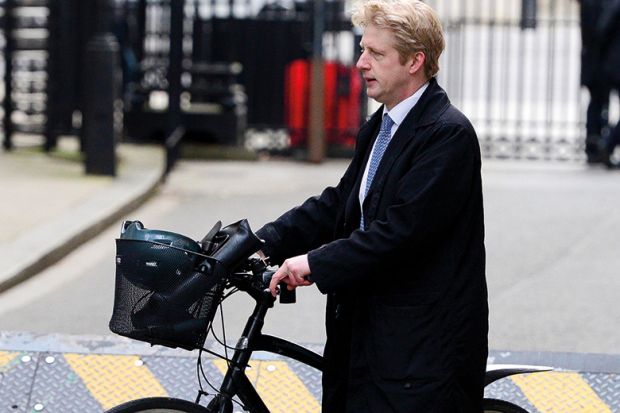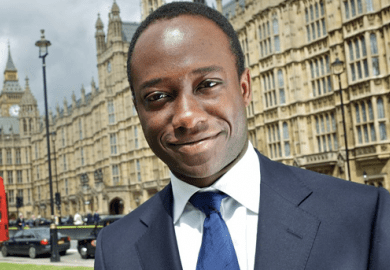When Jo Johnson became universities and science minister back in 2015, the sector did not know him well. He had dipped his toe in the debate about international students, been a parliamentary private secretary in the Department for Business, Innovation and Skills, and spent time as one of David Cameron’s key advisers in No 10.
But he had no substantial higher education providers in his constituency and had worked in journalism before entering politics. Some academics struggled to put a face to the name and many knew little about him other than that he had a famous brother.
As a pro-EU and non-ideological Tory, who sometimes seemed intentionally to distance himself from Boris in manner, Johnson might have been expected to have become a good friend to the sector. In many ways, he was. He certainly came to love aspects of it: his farewell tweet described universities as "the best thing about this country". But, as with most bold reforming ministers, the relationship has been as testy as it has been busy.
Farewell unis and science - our greatest national asset & best thing about this country. It's been an honour to have had this role - proud of all our reforms, especially the Teaching Excellence Framework & the Higher Education & Research Act. Brilliant successor in @SamGyimah
— Jo Johnson (@JoJohnsonUK) January 9, 2018
Johnson leaves behind changes of biblical proportions that make it easy to forget he was only in the post for two-and-a-half years. During that time, a Green Paper begat a White Paper, which begat a Bill which begat an Act, which begat the Office for Students and the UK Research and Innovation body. In many ways, most notably in the delivery of a new regulatory framework for higher education, he succeeded where his predecessors had failed – albeit helped by the parliamentary arithmetic of the 2015 to 2017 Parliament.
Perhaps the most well-known part of his legacy is the teaching excellence framework.
When the idea of assessing universities on their teaching was first floated, before Johnson became a minister, civil servants and many people in the sector advised that it was too difficult a task. Whatever its flaws, the rollout of the TEF was remarkably smooth, given the fierce opposition of the student movement and many academics. Putting a new focus on teaching and learning chimed with the concerns of much of the public and the media about what students receive in return for their fees, and the TEF is unlikely to disappear just because its sponsoring minister has moved on.
Until the Toby Young saga, which may or may not have sealed his fate, Johnson also had a good track record in public appointments. Chris Millward is likely to prove an excellent widening participation tsar. Chris Husbands was undoubtedly an excellent choice to run the TEF. Nicola Dandridge has her work cut out proving she can move from representing vice-chancellors to regulating them, but if anyone can do it, she can.
Given his previous closeness to Tony Blair, Michael Barber was an intriguing, challenging and counterintuitive choice for chair of the Office for Students.
There is a hackneyed journalistic trick when writing about former education ministers whereby you write a summary in the style of a school report. I have vowed never to do that but, if I did write one for Johnson, it would be much more positive than negative. Moreover, I suspect his impact may well come to be recognised more in the future than it already is.
But not everything Johnson did smells of roses. It remains an open question whether he should have reformed the Higher Education Funding Council for England (Hefce) rather than introducing all the upheaval of ripping it up and starting again. The abolition of maintenance grants was wrong and is likely to be reversed at some point. International students continue to be counted in migration targets. There has been no recovery in part-time student numbers. Yet many of the worst aspects of Johson’s time in charge were imposed by people above him in the pecking order and his job was to implement them as smoothly as possible.
There were, admittedly, moments when Johnson-the-journalist came to the fore. This sometimes made life for Johnson-the-politician harder than it needed to be – most notably perhaps when he claimed, without sufficient supporting evidence, that some university teaching is "lamentable".
But you have to be careful what you wish for in politics and, while some people might cheer the fact that Johnson has moved on, Sam Gyimah is going to find him a hard act to follow.
Nick Hillman is director of the Higher Education Policy Institute.
Register to continue
Why register?
- Registration is free and only takes a moment
- Once registered, you can read 3 articles a month
- Sign up for our newsletter
Subscribe
Or subscribe for unlimited access to:
- Unlimited access to news, views, insights & reviews
- Digital editions
- Digital access to THE’s university and college rankings analysis
Already registered or a current subscriber?







